
"My Generation" is a song by the English rock band the Who, written by guitarist and primary songwriter Pete Townshend. One of the band's most recognizable songs, it was placed number 11 by Rolling Stone on its list of the “500 Greatest Songs of All Time” in 2004 and 2010, re-ranked number 232 in the 2021 edition. It became part of The Rock and Roll Hall of Fame's 500 Songs that Shaped Rock and Roll and is inducted into the Grammy Hall of Fame for "historical, artistic and significant" value. It is considered one of the band's signature songs.

"Pinball Wizard" is a song by the English rock band the Who, written by guitarist and primary songwriter Pete Townshend and featured on their 1969 rock opera album Tommy. The original recording was released as a single in 1969 and reached No. 4 in the UK charts and No. 19 on the U.S. Billboard Hot 100.
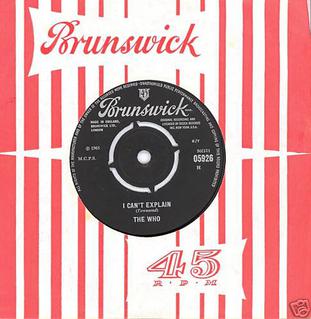
"I Can't Explain" is a song by English rock band the Who, written by Pete Townshend and produced by Shel Talmy. It was released as a single in the United States on 19 December 1964 by Decca and on 15 January 1965 in the United Kingdom by Brunswick. It was the band's second single release and first under the Who name.
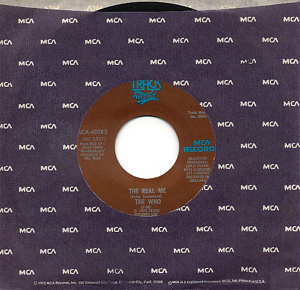
"The Real Me" is a song written by Pete Townshend on The Who's second full-scale rock opera, Quadrophenia in 1973. This is the second track on the album, although it is the first with lyrics. It concerns a boy named Jimmy, a young English Mod with four distinct personalities. The song describes how he angrily deals with several individuals to identify "the real me". The song was released as a single in the United States and Canada in 1974.

"Who Are You" is the title track on the Who's 1978 album, Who Are You, the last album released by the group before Keith Moon's death in September 1978. It was written by Pete Townshend and released as a double-A-sided single with the John Entwistle composition "Had Enough", also featured on the album. The song was one of the band's biggest hits in North America, peaking at number 7 in Canada and at number 14 in the United States, and has become one of the band's signature tunes at their live shows. The piano on the track is played by Rod Argent.

"Love, Reign o'er Me", subtitled "Pete's Theme", is a song by English rock band The Who. Written and composed by guitarist Pete Townshend, it was released on 27 October 1973 as the second single from the band's sixth studio album and second rock opera, Quadrophenia. It is the final song on the album, and has been a concert staple for years. The song peaked at number 76 on the US Billboard Hot 100 and number 54 on Cash Box.
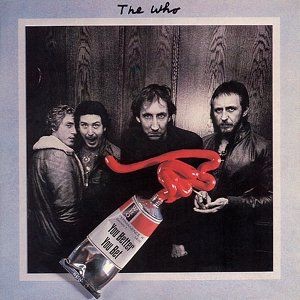
"You Better You Bet" is a song by British rock band The Who, appearing as the first track on their 1981 album Face Dances. It is sung by frontman Roger Daltrey with backing vocals from Pete Townshend and bassist John Entwistle.
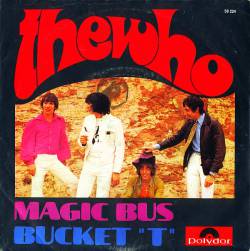
"Magic Bus" is a song recorded by British rock band the Who. It was written by their guitarist Pete Townshend during the time that their debut album My Generation was being recorded in 1965. However, it was not recorded until 1968, when it was released as a single on 27 July 1968 in the United States and Canada, followed by its release in the United Kingdom on 11 October 1968. It has become one of the band's most popular songs and has been a concert staple, although when released, the record only reached number 26 in the UK and number 25 in the United States. The song was included on their 1968 album Magic Bus: The Who on Tour.

Daltrey is the debut solo studio album by the English rock singer Roger Daltrey, lead vocalist of the Who. It was released on 20 April 1973 by Track Records in the United Kingdom and MCA Records in the United States. Daltrey was the third member of the group to make a solo album. The bulk of the record was written by David Courtney and Leo Sayer. It took six weeks to record during January and February 1973. Sessions took place at Daltrey's Barn Studio, Burwash, East Sussex, where the backing tracks were laid down; vocals, overdubs, and mixing was completed at the Beatles' Apple Studios at 3 Savile Row, and at Nova Sound Studios.

"I'm Free" is a song written by Pete Townshend and performed by the Who on the album Tommy. The song has since been released as a single, becoming one of the best known tracks from Tommy.

"Zoot Suit" b/w "I'm the Face" was the first single of the British rock band the Who, who recorded it under the name the High Numbers in an attempt to appeal to a mod audience. "Zoot Suit" was written by Peter Meaden, the band's first manager. The song is a direct copy of "Misery" by the American R&B group the Dynamics, while the B-side, "I'm the Face", is a copy of Slim Harpo's "I Got Love If You Want It." The single was meant for a mod audience, but failed to chart. The band changed their name back to The Who, found new management, and released their own composition "I Can't Explain", which became a top ten hit in the United Kingdom.

"Squeeze Box" is a song by the Who from their album The Who by Numbers. Written by Pete Townshend, the lyrics are couched in sexual double entendres. Unlike many of the band's other hits, the song features country-like elements, as heard in Townshend's banjo picking.

"Slip Kid" is a song from the Who's seventh album, The Who by Numbers. Written originally for Pete Townshend's shelved Lifehouse rock opera, "Slip Kid" was revived in 1975. The song was originally written as a warning about the music business, though Townshend has pointed out the song's relevance in different contexts. The song was released as a single in the US, backed by "Dreaming from the Waist", but failed to chart.
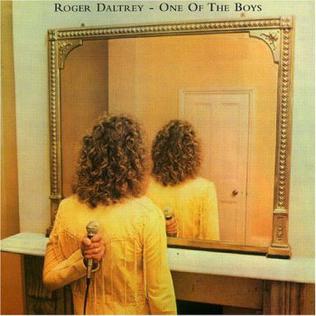
One of the Boys is the third solo studio album by the Who's lead vocalist, Roger Daltrey. It was released in 1977, on Polydor in the UK, and MCA in the US. The sessions were recorded at the Who's Ramport Studios during the winter of 1976, and Daltrey allowed students from the local Battersea technical school to film them as an educational project. This also marked the first time that Daltrey had written or co-written a song since "Here for More" in 1970, and Lisztomania in 1975. Daltrey's original choice for producers were Jerry Leiber and Mike Stoller, but they declined.

Parting Should Be Painless is the fifth studio album by English singer Roger Daltrey, released in February 1984, on the label Atlantic, in the United States, and on WEA in Germany, and Japan. The album was Daltrey's first solo album since the initial break-up of rock band the Who, and the first by any member of the band since the break-up. "Walking in My Sleep", "Parting Would Be Painless", and "Would a Stranger Do" were all released as singles. Two of those singles failed to chart, while "Walking in My Sleep" was a success, peaking at No. 4 on the Mainstream Rock Tracks chart.

"It's Hard" is a song written by Pete Townshend that featured on British rock band The Who's tenth album, It's Hard, of which it was the title track. It was released as the third and final vinyl single from the album in 1983, backed with the John Entwistle written song "Dangerous", but failed to chart, although it reached number 39 on the Billboard Hot Mainstream Rock Tracks. This would become the last Who single of new material until "Real Good Looking Boy" in 2004, and the last album single by them until "Black Widow's Eyes", two years later.
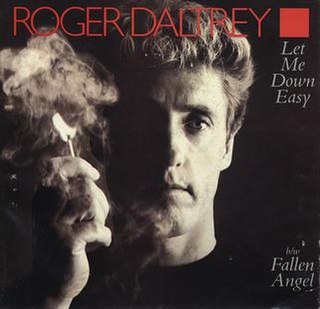
"'Let Me Down Easy'" is a song by Roger Daltrey, who at the time was the former lead vocalist of the Who. The song was written by Bryan Adams and Jim Vallance and included on Daltrey's sixth solo studio album Under a Raging Moon (1985) as the first track on the second side of the LP. The album was a tribute to the Who's former drummer Keith Moon. The song was released as a single in November 1985 on Atlantic Records.
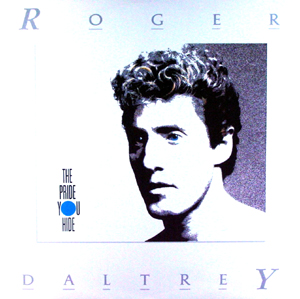
"The Pride You Hide" is a song by Roger Daltrey, who at the time was the former lead singer of The Who. The song was written by Alan Dalgleish, Nicky Tesco and Roger Daltrey. The track was included on Roger Daltrey's sixth solo album, Under a Raging Moon, as the fourth track on the first side of the LP. The album was a tribute to The Who's former drummer Keith Moon.

"Quicksilver Lightning" is a song by Roger Daltrey, who at the time was the former lead singer of The Who. The track is credited as being written by Dean Pitchford and being composed by Giorgio Moroder. The track is the theme tune for the 1986 film Quicksilver starring Kevin Bacon, Jami Gertz, Paul Rodriguez, Louie Anderson, Laurence Fishburne and Rudy Ramos. The film was directed by Thomas Michael Donnelly. The film went quite unnoticed, so both the song and the film are not easily remembered.

"One Man Band" is a song by the Who's lead singer Roger Daltrey, from his debut solo studio album Daltrey. The song was written by David Courtney and Leo Sayer, and featured Daltrey's acoustic guitar strumming. According to Daltrey, it "reminiscences of Shepherd's Bush" [A place in west London where Daltrey had grown up and the Who were formed] and became one of the highlights of the album, and later released as a single in its own right in some European territories.




















